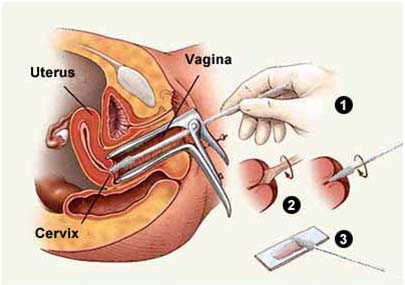Cervical cancer is one of the most common diseases among women globally. In Malaysia, it is the second most common cancer in women. In Singapore, more than 1 case of cervical cancer is diagnosed every 2 days and more than 1 woman dies of cervical cancer every week. It is evident that human papilloma virus (HPV) infection is associated with high risk of developing cervical cancer. But what can be done to prevent the development of the cancer?
Ways to Prevent Cervical Cancer
 Early Detection – Pap Smear
Early Detection – Pap Smear
Pap smear – short for the name “Papanicolaou†smear test – is a screening procedure to detect lesions in the cervix. Cervical cancer can be prevented by early detection of pre-cancerous lesions through repeated Pap smear screening and early treatment of these lesions before it progress to become malignant, i.e. cancerous.

Although Pap smear is an invasive procedure, many patients do not experience much uneasiness if any at all. How it is done, is that the doctor will clean the female private part using saline and cotton and then inserts a speculum which will widen the vaginal passage in order for the doctor to have a clearer examination of the appearance of the cervix.
 The doctor will then insert an instrument through the vagina and gently scrape some cell samples from the opening of the cervix for laboratory examinations under microscope to look for any abnormalities of the tissues. The results will be revealed within a week, depending on the productivity of the laboratory, it can be earlier or later than that.
The doctor will then insert an instrument through the vagina and gently scrape some cell samples from the opening of the cervix for laboratory examinations under microscope to look for any abnormalities of the tissues. The results will be revealed within a week, depending on the productivity of the laboratory, it can be earlier or later than that.
It is recommended in America that females above 21 years of age should be screened. In the United Kingdom, the recommended age is 25 years old. However, in Asia, due to culture differences, usually married women are encouraged to undergo the Pap smear screening test. All in all, no matter the recommended age to start the screening, Pap smear should be repeated every 1 to 3 years until the age of 60. Even though you have already been vaccinated against HPV, Pap smear screening should still be performed and repeated.
 Vaccination – antiHPV vaccines
Vaccination – antiHPV vaccines
Gardasil®
This is a quadrivalent HPV recombinant vaccine which covers HPV types 6, 11, 16, and 18. Types 6 and 11 are strains of HPV that cause genital warts. They do not cause cervical cancer. On the other hand, types 16 and 18 are HPV strains which are highly associated with the premalignant changes of the cervical lining resulting in cancer.
 Gardasil® is a product from the Merck & Co., USA. Its coverage of the extra 2 benign strains of HPV is said to have made the vaccine more expensive.
Gardasil® is a product from the Merck & Co., USA. Its coverage of the extra 2 benign strains of HPV is said to have made the vaccine more expensive.
One additional point worth mentioning is that, Gardasil® is also indicated in the masculine community to prevent anal cancer which can be caused by HPV types 16 and 18, and of course, the genital warts from HPV types 6 and 11.
Cervarixâ„¢
This is a pure cervical cancer vaccine. So-called “pure†because this bivalent vaccine covers both the HPV types 16 and 18 only – the two strains of the virus that fall under the high risk category of causing cervical cancer. It does not vaccinate against HPV which causes genital warts.
Indeed Cervarixâ„¢ is slightly cheaper in terms of cost, probably due to the lesser coverage of the strains. However, the British product of GlaxoSmithKline has evidently showed that its efficacy lasts 7 years after vaccination.
Both the vaccines are administrated in 3 doses. First and second doses are given one month apart and the third dose is given 6 months after the first dose. It is important to note that not a single dose is to be missed, as all vaccinations which are given in separate doses.
Even though it is recommended that the HPV vaccination should be given to female age 9 to 26 years old, many doctors do administer the injection to women of age more than 26 years old. The age range recommendation is stated as such due to the subjects who are involved in the clinical trials conducted by the pharmaceutical company are age between 9 to 26 years old. Thus, in the strict command of medical terms, it is recommended that the vaccines be given to females who fall within the age range as mentioned in the latter.
The HPV vaccines are prophylactic vaccines which help to prevent or reduce the risk of developing cervical cancer. It is not a medication to treat the existing disease. Many developed and developing countries have started to implement the HPV vaccine into the immunization schedule among school children. Contact your doctor to find out more regarding the suitability of the vaccine to you or your female friends and relatives.
